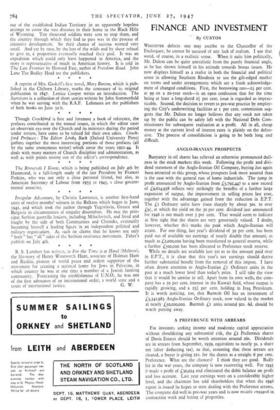FINANCE AND INVESTMENT
By CUSTOS
WHATEVER defects one may ascribe to the Chancellor of the Exchequer, he cannot be accused of any lack of realism. I use that word, of course, in a realistic sense. When it suits him politically, Mr. Dalton can be quite unrealistic from the purely financial angle, as he has shown himself in his attitude towards bonus issues. He now displays himself as a realist in both the financial and political sense in allowing Southern Rhodesia to use the gilt-edged market on terms and under arrangements which are a frank acknowledge- ment of changed conditions. First, the borrowing rate-24 per cent. at 99 on a 20-year stock—is an open confession that for the time being at least a long-dated 21 per cent, issue is regarded as imprac- ticable. Second, the decision to revert to pre-war practice by employ- ing the City's underwriting facilities at i per cent, commission sug- gests that Mr. Dalton no longer believes that any stock not taken up by the public can be safely left with the National Debt Com- missioners for subsequent realisation at a profit. All in all, cheap money at the current level of interest rates is plainly on the defen- sive. The process of consolidation is going to be both long and difficult.
ANGLO-IRANIAN PROSPECTS Buoyancy in oil shares has relieved an otherwise pronounced dull- ness in the stock markets this week. Following the profit and divi- dend statement of the Anglo-Iranian Oil Company, buying has again been attracted to this group, whose prospects look more assured than is the case with the general run of home industrials. The jump in profit announced by Anglo-Iranian from £5,792,447 to a new record of £9,624,938 reflects very strikingly the benefits of a further large expansion of output, the improvement in selling prices last year, together with the advantage gained from the reduction in E.P.T. The Li Ordinary units have risen sharply by about 30s. to over L91, at which the yield on the 30 per cent, dividend just announced for 1946 is not much over 3 per cent. That would seem to indicate at first sight that the shares are very generously valued. I doubt, however, whether this 'marks the peak which Anglo-Iranian will attain. For one thing, last year's dividend of 30 per cent, has been paid out of available net earnings of nearly double that amount, as much as £2,000,000 having been transferred to general reserve, while a further Lsoo,000 has been allocated to Preference stock reserve.
While no details are available just yet as to the amount paid over in E.P.T., it is clear that this year's net earnings should derive further substantial benefit from the removal of this impost. I have often drawn attention to Anglo-Iranian Li Ordinary units in the past at a much lower level than today's price. I still take the view that it would be unwise to sell. Apart from its own wells, the com- pany has a so per cent, interest in the Kuwait field, whose output is rapidly growing, and a 231 per cent, holding in Iraq Petroleum. It is worth noticing, too, that Burmah Oil has an investment of £5,342,985 Anglo-Iranian Ordinary stock, now valued in the market at nearly Lso,000,000. Btirmah Li units around 92s. 6d. should be worth putting away.
A PREFERENCE WITH ARREARS For investors seeking income and moderate capital appreciation without shouldering any substantial risk, the Li Preference shares
of Davis Estates should be worth attention around 265. Dividends are in arrears from September, 1939, equivalent to nearly 5s. a share net (after deducting tax), so that, assuming that these arrears are cleared, a buyer is giving 21S. for the shares as a straight 6 per cent. Preference. What are the chances? I think they are good. Badly hit in the war years, the company is now recovering well. For 1945 if made a profit of £30,024 and eliminated the debit balance on profit and loss account. Last year earnings were on a considerably higher level, and the chairman has told shareholders that when the 1946 report is issued he hopes to start dealing with the Preference arrears. The company did well in pre-war years and is now mainly engaged in contracting work and letting of properties.


































 Previous page
Previous page